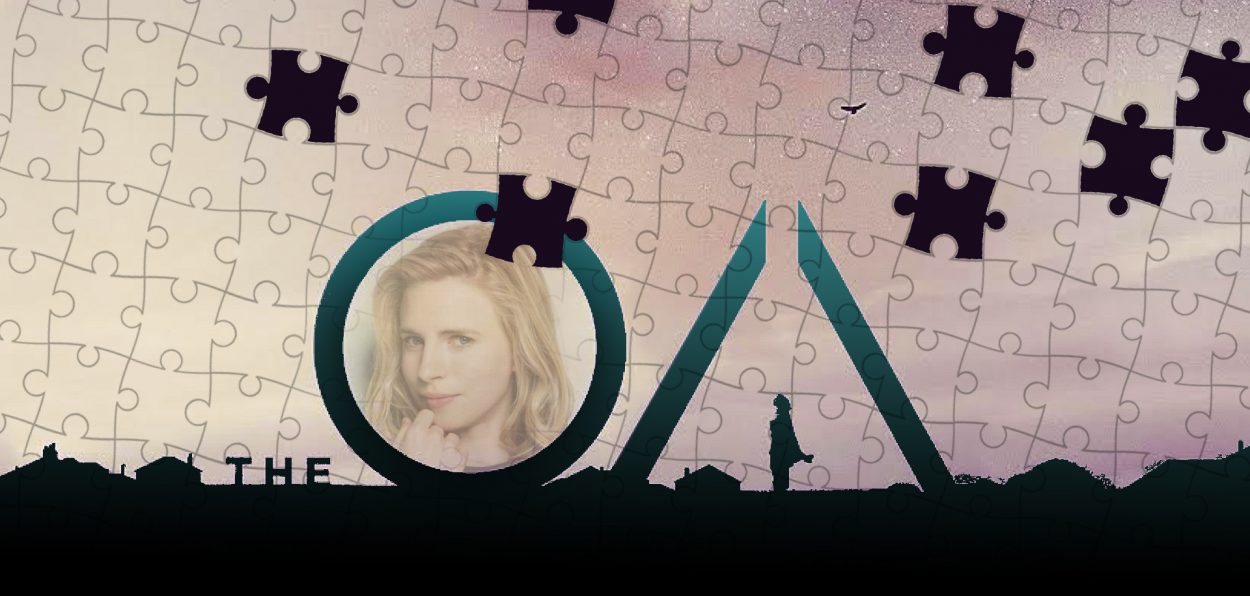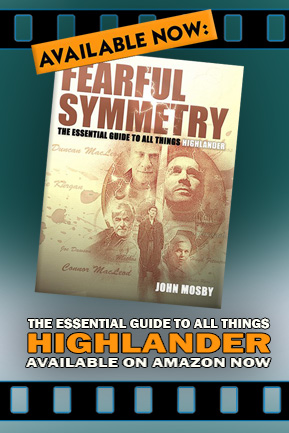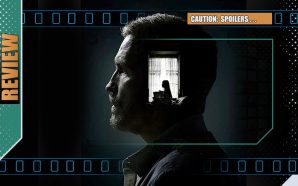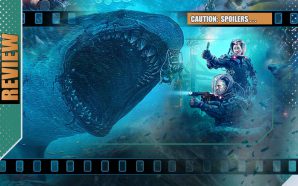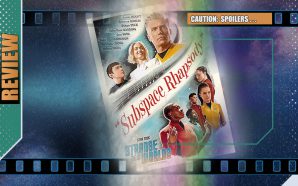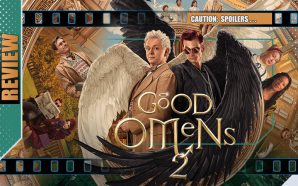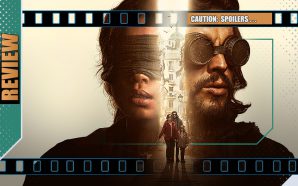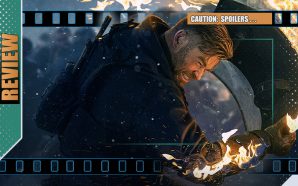There’s something weird about Netflix‘s new offering The OA and it’s not just the story itself – though that’s a good place to start.
A young woman (Brit Marling) jumps from a city bridge, her leap caught on camera. At first she’s a Jane Doe, but with the footage going viral, she’s quickly identified by her adoptive parents (Alice Krige and Scott Wilson) as their daughter Prairie Johnson who has been missing for seven years. Even more bizarre and unexpected than her sudden return is the fact that Prairie was blind when she vanished and now can see perfectly well. Despite strange and dramatic scarring patterned into her back, she won’t say where she’s been but insists that her new name is ‘The OA’.
She creates quite an impact on her home town, at first the subject of much media attention and then getting strong reactions are her attempts to readjust don’t go well. Some neighbours are concerned, others frightened and some, such as troubled teenager Steve (Patrick Gibson) see her as an easy target to manipulate. But Prairie’s life-long secrets are going to have an effect on everyone and as she selects five individuals to help her with her plans to reconnect with her seven years away, it becomes clear the reactions to her activities will only get stronger. But so will she.
Surprisingly announced and trailered less than a week before its arrival, The OA‘s full run of eight episodes arrived on screens last week with a story that feels at one point precarious and fragile and in another moment grounded in the mundane. Plenty of shows and stories have achieved such balance – Stephen King has made a career of it – but here so much of the story begins by revolving around dysfunctional people with only winks and nods to something else going on beyond the framing of the screen. Think of it as a counter-balance to the way-out Twin Peaks that wore the bizarre on its sleeve. Here the fantastical is tucked away like an item of dirty laundry or whispered about in wonder.
This is a series that genuinely asks some profound questions about the nature of life and suffering but in doing so it alternates between the deep mysteries of existence and our purpose, the kind that might be related by the holiest of shaman and the kind of dialogue more likely to found in a self-help guide for millennial angst. The truth is that I desperately wanted to like it – I love shows that take chances whether they succeed or not – but as a reviewer it’s difficult to look past some aspects that just don’t work logically or contradict each other for no reason and ultimately, despite willing it to soar, The OA‘s reach exceeds its grasp.
What’s also off-balancing is the pacing, a series of contemporary drama and flashbacks to those missing years as Prairie claims to be revealing what happened… and why. The opening episode, running well over the usual hour, meanders along with little sense of direction – sometimes racing ahead, sometimes kicking its heels over small details and then has its ‘opening’ credits placed three quarters of the way through the episode… there doesn’t seem to be any real reason for that decision apart from, well… being a little bit, ever so artsy. Episodes then vary in length and while that’s an interesting experiment (having a running time linked to content rather than the other way around) it can come across as self-indulgent as well. ‘Artsy’ also sums up the early installments. The OA initially feels like a piece of improvised performance art or, appropriately, interpretive dance: desperately trying to be seen as ambitious, relevant and saying something about something, but is actually somewhat adrift in it’s own ‘blue sky thinking’. From its deliberately oblique title to its obscure execution, it all feels like an interesting premise that is in search of a direction and then proclaiming as it drifts away that the whole thing was about relying too much on rudders.
This is a series that genuinely asks some profound questions about the nature of life and suffering but in doing so it alternates between the deep mysteries of existence and our purpose that might be related by the holiest of shaman… and the kind of dialogue more likely to found in a self-help guide for millennial angst…
It feels like yet another US remake of a Danish thriller, but this one is entirely homegrown. There’s a semi-successful attempt to capture a sense of ethereal whimsy akin to the smash-success of Stranger Things – a group of adolescents and adults realising that there are ‘more things in heaven or earth than are dreamed of in their philosophy’ – but it mistakenly jettisons that show’s nostalgia aspect in favour of an older demographic, some needless random nudity, violence, a sprinkling of swearing and minimal development of the supporting cast beyond the central group. While Stranger Things had an inner warmth, the pale blue hues make much of The OA seem much colder. Stranger Things‘ had instantly likable characters, The OA really doesn’t give us anyone to immediately root for. Prairie (and the winner for most pretentious character name of 2016 goes to…) herself is sometimes cold and diffident and while we initially sympathise with her confusion at being ‘back in the world’, her reclusive and impulsive actions start to alienate her not just from her family but the audience. Patrick Gibson’s Steve is introduced as an utterly detestable bully whom we presume will be the antagonist but then the narrative implores us to see him as unfulfilled and misunderstood – this coming close on the heels of him delivering a premeditated punch to someone in the throat to deliberately ruin their signing career. It’s hard to begin rooting for someone we’ve already deemed a scumbag and it takes several episodes to get us back on side.
Scott Wilson (late of The Walking Dead and Bosch) and Alice Krige (Star Trek) are good as the parents who never gave up hope but harbour a sense of abandonment. They have key scenes rather than a real presence throughout and a conversation in the final episode reminds us how much they’ve been kept at a distance for no real reason. Jason Isaacs – as the man who took Prairie and who is scientifically obsessed with finding the truth about the afterlife – plays his role with earnest, a cold man with a singular passion that frames all his bad decisions, but by the time the story’s told its frustratingly without resolution. Equally it’s rather bizarre to see Spanish sensation Paz Vega in a later-addition role that seems built up by casting and character to be important and then seems rather superfluous to requirements.
Chicago-born Brit Marling has something of a Nordic look, specialising in indy roles where a strikingly elegant character has to frown and internalise a lot behind bright quizzical blue eyes and flowing fair hair. But she’s a multi-tasker and probably hit your radar a few years ago when she wrote and starred in Another Earth (2011), an arthouse movie with a science-fiction twist of parallel worlds and then The East, the 2013 story of an FBI agent given a mission to infiltrate a cult, only to find herself ultimately torn between the questionable tactics of both her real boss and her group bretherin. Alexander Skarsgård and Ellen Page co-starred in the latter and it was one of those films that was interesting rather than entertaining – a competent, zig instead of zag thriller that erred just on the right side of being a bit preachy. It was directed by Zal Batmanglij who also directed her in The Recordist and The Sound of my Voice and once again helms proceedings here in perhaps too-familiar style.
With its meandering narrative and left-field finale climax (that feels wholly unexpected, even as it ties together the spirit of the mini-series) The OA ultimately feels like a work-in-progress project that can’t decide whether it wants to be a traditional ‘event series’ or a more studious commentary on faith. The result is that it is sometimes an uncomfortable mix that never quite satisfies either and manages to tie itself in knots continuity-wise. Like an abstract painting in a gallery: tall, wide, full of textures and controversy, but roped off and just out of reach, The OA may have its power in how it affects you individually and from a distance rather than any critique offered. (Close-scrutiny simply shows up the obvious and fatal flaws that balance the better elements). For some it will simply evoke varied emotions: passion and wonder and immediate binge-watching again to see if reads differently or frustration and annoyance at the various (literal) hand-wavering conclusions at its offerings… for others, merely a shrug of apathy as one tries vainly to find the artist’s original intent in the resulting patterns.
The show postulates, though it takes it time to set out its stall, that perhaps both views are perfectly valid and that it’s encouraging you to decide its meaning for yourself. That’s either amazingly profound or the ultimate get-out-of-jail-free card. It will certainly provide a lot of discussion and arguments whatever position you ultimately side with.
And it undeniably puts the odd into odyssey.
- Premise / Potential8
- Acting7
- Pacing7

